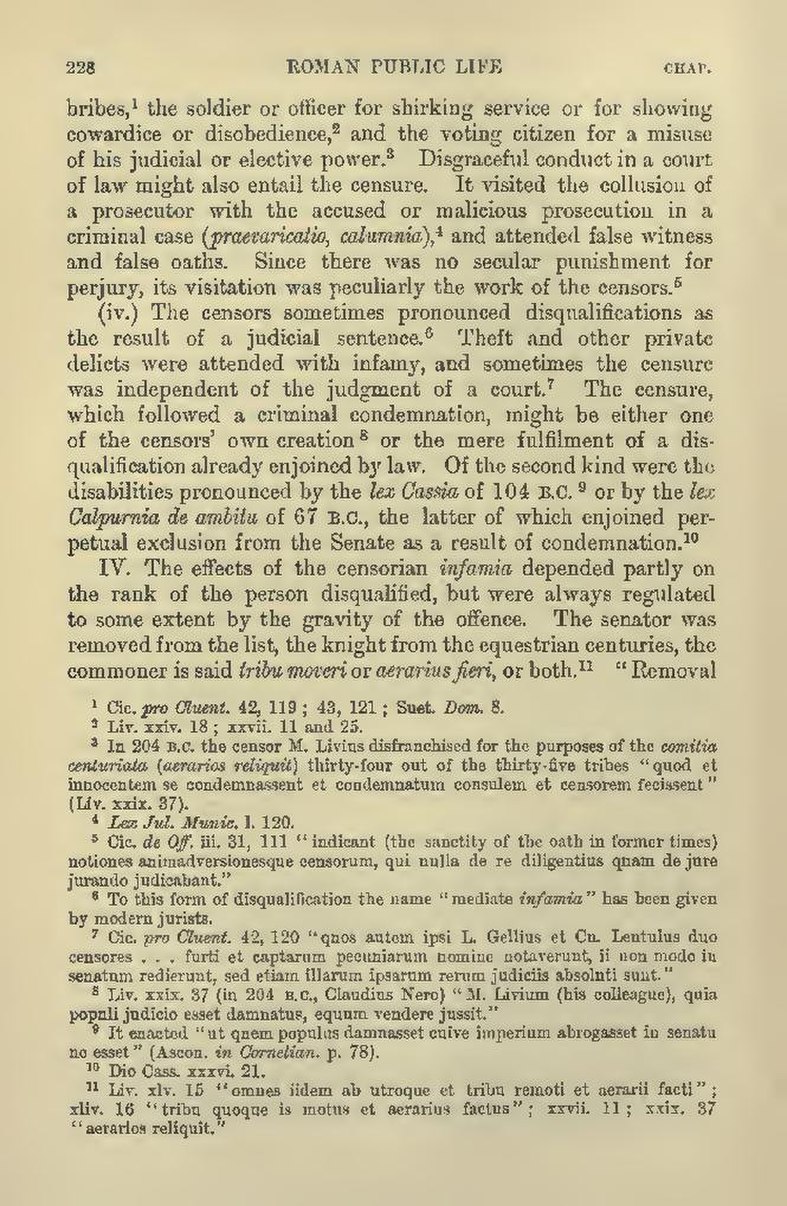bribes,[1] the soldier or officer for shirking service or for showing cowardice or disobedience,[2] and the voting citizen for a misuse of his judicial or elective power.[3] Disgraceful conduct in a court of law might also entail the censure. It visited the collusion of a prosecutor with the accused or malicious prosecution in a criminal case (praevaricatio, calumnia),[4] and attended false witness and false oaths. Since there was no secular punishment for perjury, its visitation was peculiarly the work of the censors.[5]
(iv.) The censors sometimes pronounced disqualifications as the result of a judicial sentence.[6] Theft and other private delicts were attended with infamy, and sometimes the censure was independent of the judgment of a court.[7] The censure, which followed a criminal condemnation, might be either one of the censors' own creation[8] or the mere fulfilment of a disqualification already enjoined by law. Of the second kind were the disabilities pronounced by the lex Cassia of 104 B.C.[9] or by the lex Calpurnia de ambitu of 67 B.C., the latter of which enjoined perpetual exclusion from the Senate as a result of condemnation.[10]
IV. The effects of the censorian infamia depended partly on the rank of the person disqualified, but were always regulated to some extent by the gravity of the offence. The senator was removed from the list, the knight from the equestrian centuries, the commoner is said tribu moveri or aerarius fieri, or both.[11] "Removal
- ↑ Cic. pro Cluent. 42, 119; 43, 121; Suet. Dom. 8.
- ↑ Liv. xxiv. 18; xxvii. 11 and 25.
- ↑ In 204 B.C. the censor M. Livius disfranchised for the purposes of the comitia centuriata (aerarios reliquit) thirty-four out of the thirty-five tribes "quod et innocentem se condemnassent et condemnatum consulem et censorem fecissent" (Liv. xxix. 37).
- ↑ Lex Jul Munic. l. 120.
- ↑ Cic. de Off. iii. 31, 111 "indicant (the sanctity of the oath in former times) notiones animadversionesque censorum, qui nulla de re diligentius quam de jure jurando judicabant."
- ↑ To this form of disqualification the name "mediate infamia " has been given by modern jurists.
- ↑ Cic. pro Cluent. 42, 120 "quos autem ipsi L. Gellius et Cn. Lentulus duo censores . . . furti et captarum pecuniarum nomine notaverunt, ii non modo in senatum redierunt. sed etiam illarum ipsarum rerum judiciis absoluti sunt."
- ↑ Liv. xxix. 37 (in 204 B.C., Claudius Nero) "M. Livium (his colleague), quia populi judicio esset damnatus, equum vendere jussit."
- ↑ It enacted "ut quem populus damnasset cuive imperium abrogasset in senatu ne esset" (Ascon. in Cornelian. p. 78).
